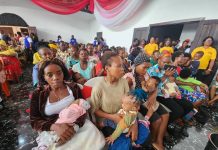 |
|
Governor Abdulfatah Ahmed of Kwara state
|
The kwara Commissioner for Health, Dr Suleiman Alege, has
said that the state has set up a Technical Advisory Committee on Neglected
Tropical Diseases (NTDs), especially River Blindness.
said that the state has set up a Technical Advisory Committee on Neglected
Tropical Diseases (NTDs), especially River Blindness.
Alege, who made this known in Ilorin on Saturday when he
received the Sight Savers of Nigeria, said the the committee would assist
eliminating river blindness and other diseases in the state.
received the Sight Savers of Nigeria, said the the committee would assist
eliminating river blindness and other diseases in the state.
He said the Federal Government had launched a robust and
integrated multi-year national plan to control and eliminate the river
blindness in Nigeria by 2020.
integrated multi-year national plan to control and eliminate the river
blindness in Nigeria by 2020.
The commissioner said that
the government had inaugurated a committee to work with the affected
local governments in the state to reduce the scourge in the communities.
the government had inaugurated a committee to work with the affected
local governments in the state to reduce the scourge in the communities.
The commissioner explained that NTDs were poverty-related
and degenerating diseases.
and degenerating diseases.
He included astrachoma, leprosy, buruli ulcer,
elephantiasis, soil transmitted helminthes, schistosomiasis and river
blindness, among others as degenerating diseases.
elephantiasis, soil transmitted helminthes, schistosomiasis and river
blindness, among others as degenerating diseases.
“We experience the bigger burden of the disease in Nigeria,
hence we must put all measures on ground to solve the issue because NTDs are
becoming a growing concern which must be tackled holistically,” he said.
hence we must put all measures on ground to solve the issue because NTDs are
becoming a growing concern which must be tackled holistically,” he said.
Alege noted the state government would not leave any stone
unturned in making health-care delivery available and affordable in every nook
and cranny of the state.
unturned in making health-care delivery available and affordable in every nook
and cranny of the state.
Earlier in his address, the Sight Savers Country Director
for Nigeria and Ghana, Dr Isiyaku Sunday, said the visit was aimed at advocating
for government’s to eliminate river blindness in the state.
for Nigeria and Ghana, Dr Isiyaku Sunday, said the visit was aimed at advocating
for government’s to eliminate river blindness in the state.
He said Sight savers was the leading NGO supporting
onchocerciasis in Africa, adding that they are working in some African
countries like Nigeria, Cameroon, Sierra Leone, Liberia, Uganda, among others.
onchocerciasis in Africa, adding that they are working in some African
countries like Nigeria, Cameroon, Sierra Leone, Liberia, Uganda, among others.
Sunday said Nigeria bears 25 per cent of the NTDs burden in
the African sub region with some of the NTDS being in the highest number of
reported cases globally.
the African sub region with some of the NTDS being in the highest number of
reported cases globally.
According to him, this makes them to impact negatively on
life expectancy, education and economic opportunities of affected individuals
and the communities they live in.
life expectancy, education and economic opportunities of affected individuals
and the communities they live in.
He added that the disease could be treated and prevented but
were known to affect the poorest, most marginalised and most remote communities
in the world.
were known to affect the poorest, most marginalised and most remote communities
in the world.
He explained that they thrive where access to potable water,
sanitation and hygiene, health-care and good housing conditions were limited or
even lacking.
sanitation and hygiene, health-care and good housing conditions were limited or
even lacking.







